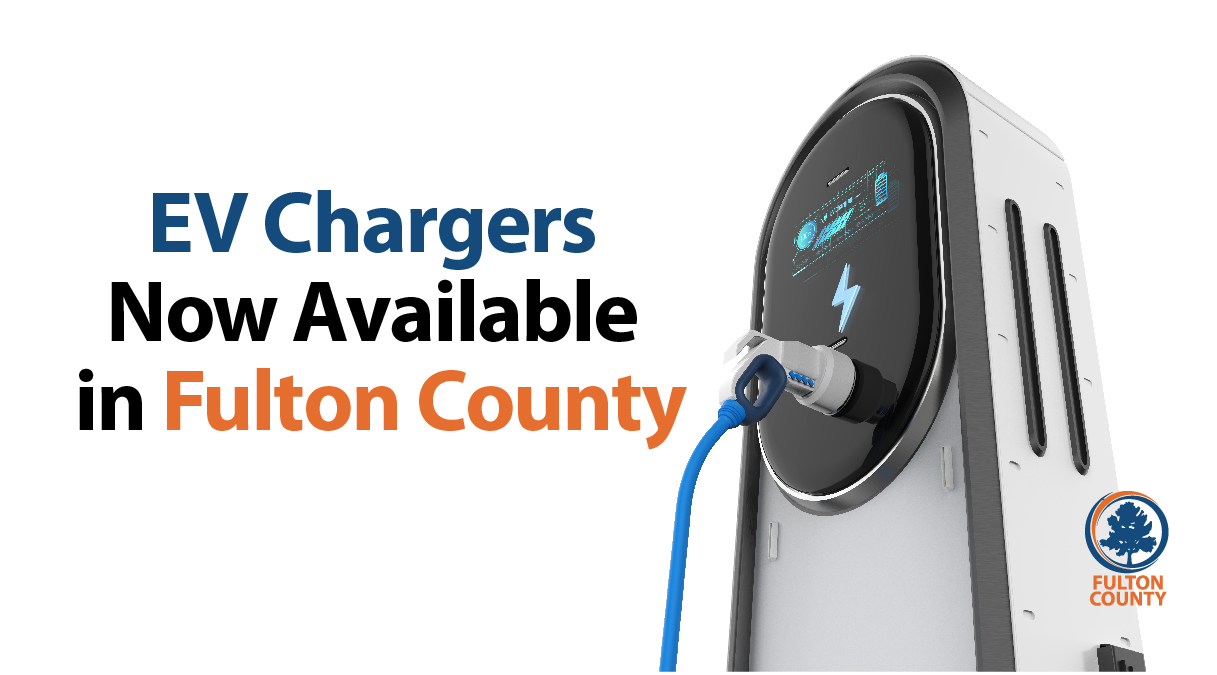Public EV chargers to go live at two Fulton County sites

Public EV chargers to go live at two Fulton County sites
August 08, 2025
Rate approval finalizes implementation of County priority
After the Fulton County Board of Commissioners approved a rate for public use of EV charging stations on Wednesday, August 6, chargers have become operational at two sites: the Metropolitan Library and Fulton County Animal Services Facility.
In mid-March, four EV chargers were installed at the Metropolitan Library parking lot, located at 1332 Metropolitan Parkway. Later, two additional EV charging stations were set up at Fulton County Animal Services Facility, located at 1251 Fulton Industrial Blvd. NW.
Although the infrastructure was ready, activation awaited approval of a rate by the Board of Commissioners: 25 cents per kilowatt-hour (kWh), an average rate for the Metro Atlanta area. After two hours, drivers will be charged an additional $2 per hour.
Besides the Fulton County rate, users might also face extra fees charged directly by the charging station vendor, which Fulton County would not get. Vendor fees will be disclosed to users beforehand.
“Three of the charging stations at Metropolitan Library have dual ports while the fourth has one, for a total of seven able to charge vehicles at the same time,” said Jessica Lavender, Energy & Sustainability Manager in the Department of Real Estate & Asset Management (DREAM). “Per a City of Atlanta requirement, the one-port charger is at an ADA-accessible parking space. A sign designating several parking spots for charging electric vehicles will be added,” she said.
The new chargers are part of a broader initiative to install EV chargers at all County buildings where they are feasible, as directed by a 2022 Board of Commissioners resolution.
Metropolitan Library was selected as the site for Fulton County’s first public chargers because, in October 2021, it was announced as the future home of the Fulton County Community Resilience Hub, which will help surrounding neighborhoods respond to and recover from crises such as extreme weather events and public health emergencies.
“We’re excited to be seeing some movement toward the realization of the Metropolitan Library as the resilience hub,” said Mary Inman, principal librarian at the Metropolitan branch.
She hopes that the presence of EV chargers will draw more attention to the library in general, attracting more people to use its services – both residents of nearby neighborhoods and people who are searching online for a place to charge their vehicles.
Inman said she hopes to buy an electric car for her next car.
“It would certainly be convenient to be able to charge while at work,” she said.
The resilience hub project is funded by a $300,000 grant awarded by the Southeast Sustainability Directors Network (SSDN) and the Southeast Sustainable Communities Fund (SSCF).
A battery backup system will be connected to the solar panels on the library roof, so the facility could still have power during an outage, Lavender said.
The CT 4000 Level 2 Commercial Charging Stations, made by California-based ChargePoint, have J1772 connectors, the North American standard, Lavender said.
As Level 2 chargers, the ChargePoint stations can take about eight hours to fully charge an electric vehicle. That’s probably too long for library patrons to do more than top off their vehicles’ charge, but people in the surrounding residential areas could leave their cars for a full charge, Lavender said.
Georgia Power provided the underground electrical infrastructure through its Make Ready Program. As mandated by the Georgia Public Service Commission, the Make Ready Program provides free electrical infrastructure for a certain number of public EV charging station projects each year.
.
In mid-March, four EV chargers were installed at the Metropolitan Library parking lot, located at 1332 Metropolitan Parkway. Later, two additional EV charging stations were set up at Fulton County Animal Services Facility, located at 1251 Fulton Industrial Blvd. NW.
Although the infrastructure was ready, activation awaited approval of a rate by the Board of Commissioners: 25 cents per kilowatt-hour (kWh), an average rate for the Metro Atlanta area. After two hours, drivers will be charged an additional $2 per hour.
Besides the Fulton County rate, users might also face extra fees charged directly by the charging station vendor, which Fulton County would not get. Vendor fees will be disclosed to users beforehand.
“Three of the charging stations at Metropolitan Library have dual ports while the fourth has one, for a total of seven able to charge vehicles at the same time,” said Jessica Lavender, Energy & Sustainability Manager in the Department of Real Estate & Asset Management (DREAM). “Per a City of Atlanta requirement, the one-port charger is at an ADA-accessible parking space. A sign designating several parking spots for charging electric vehicles will be added,” she said.
The new chargers are part of a broader initiative to install EV chargers at all County buildings where they are feasible, as directed by a 2022 Board of Commissioners resolution.
Metropolitan Library was selected as the site for Fulton County’s first public chargers because, in October 2021, it was announced as the future home of the Fulton County Community Resilience Hub, which will help surrounding neighborhoods respond to and recover from crises such as extreme weather events and public health emergencies.
“We’re excited to be seeing some movement toward the realization of the Metropolitan Library as the resilience hub,” said Mary Inman, principal librarian at the Metropolitan branch.
She hopes that the presence of EV chargers will draw more attention to the library in general, attracting more people to use its services – both residents of nearby neighborhoods and people who are searching online for a place to charge their vehicles.
Inman said she hopes to buy an electric car for her next car.
“It would certainly be convenient to be able to charge while at work,” she said.
The resilience hub project is funded by a $300,000 grant awarded by the Southeast Sustainability Directors Network (SSDN) and the Southeast Sustainable Communities Fund (SSCF).
A battery backup system will be connected to the solar panels on the library roof, so the facility could still have power during an outage, Lavender said.
The CT 4000 Level 2 Commercial Charging Stations, made by California-based ChargePoint, have J1772 connectors, the North American standard, Lavender said.
As Level 2 chargers, the ChargePoint stations can take about eight hours to fully charge an electric vehicle. That’s probably too long for library patrons to do more than top off their vehicles’ charge, but people in the surrounding residential areas could leave their cars for a full charge, Lavender said.
Georgia Power provided the underground electrical infrastructure through its Make Ready Program. As mandated by the Georgia Public Service Commission, the Make Ready Program provides free electrical infrastructure for a certain number of public EV charging station projects each year.
.

